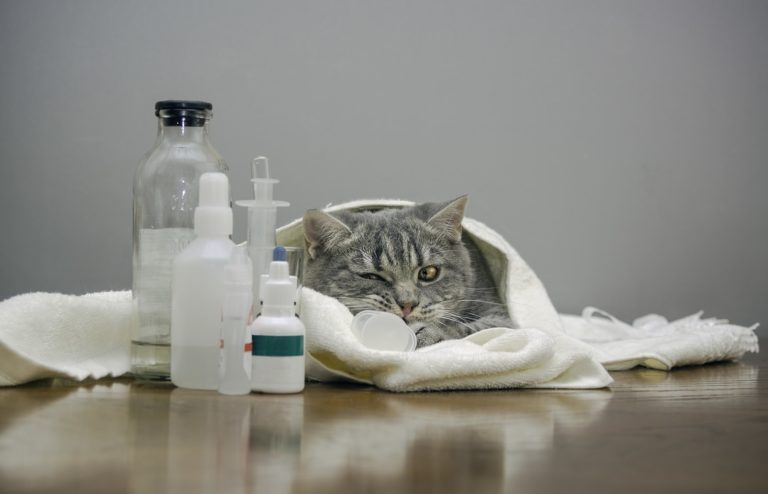As the weather warms, gearing up for summer, allergies are on the rise. Our cats are not immune to unpleasant reactions associated with an increase in fleas and triggers such as pollen and grasses along with other allergy causes both inside and outside the home.
Typically, cats don’t suffer from runny noses and watery eyes, but symptoms that your pet could have a problem do include sneezing, wheezing, itching, scratching and pawing their faces.
It’s important to be vigilant and seek veterinary attention at the first signs of a problem and consult with your veterinary partners. And, it goes without saying never administer human medications which could be very harmful.
Symptoms and Relief for Our Feline Friends
Here is a checklist of common allergic reactions in felines and hints to deal with the problems.
Fleas
It takes only one fleabite for a cat to have a very bad allergic reaction scratching and biting herself until she draws blood. Even if you have an indoors-only feline, she can be infected from fleas transported into the home by a dog or people. Fleas only spend twenty percent of their time on pets; thereafter transfer to your carpets, furniture and drapes. Vacuum cleaners that have built-in ultra violet lights are excellent because the light kills existing fleas and any eggs waiting to hatch. If you need to treat your home with toxic sprays, be sure to remove your cats for the duration of the treatment and for a few days after.
Dust mites
Dust mites are the most common household allergen causing allergic reactions in cats. These minuscule mites live on dead skin cells and other detritus in house dust. Again, it’s important to regularly vacuum all the places that your cat has designated as snooze zones. Be sure to include under the beds in the home too. Also wash pet beds and bedding on a regular basis.
Household Mold
Mold is a fungus. Mold spores trigger reactions like allergic rhinitis or asthma and also produce volatile organic compounds (VOCs) – that musty odor that irritates eyes, nose, and throat. Mold means an all-out war in the household. Wash infected areas with bleach to remove the visible signs. HEPA filters installed in the home will help to clean the air, and dehumidifiers will prevent mold growth. Infections from mold are often mistreated because they have been wrongly diagnosed as an allergy to pollen or dust mites. So be sure to tell your veterinarian if you have a mold issue.
Assuming your cat is allowed outside in to a safe and secure environment, the best way to control exposure to outdoor allergens is to keep her inside when the wind is blowing or you recently mowed the lawn. Reactions to such allergens can be nasal but spread throughout the body causing lethargy, depression vomiting and diarrhea. It’s definitely worth a trip to the vet for proper diagnosis.
Smoke — First, Second and Third Hand …
The risks associated with smoking and the dangers of secondhand smoke have been well publicized. But we tend to forget about third-hand smoke — residual tobacco smoke contamination that accumulates in indoor living spaces and on the hair, skin, clothing, and personal effects of smokers. Our pets are very susceptible because they are walking and sleeping on such surfaces and then lick their paws or put their toys in their mouths. The answer – make your home environment completely smoke-free.
Essential Oil Diffusers
In concentrated form, essential oils are toxic to felines as cats lack the necessary enzymes in the liver to break down and excrete the chemical compounds found naturally in essential oils. Hydrosols – oils that have been through a special water/steam process — are okay. Beware of common air fresheners too – they have been known to cause allergic reactions in both people and pets.
Cleaning Products
It’s important to remember that pets walk on most of the surfaces we clean all the time and if the household cleaners are not natural and environmentally safe and non-toxic, they can cause direct skin and fur allergic reactions. Also pets constantly wash themselves and lick their paws ingesting cleaning products in the process.
Rethinking the food and water bowls.
Some cats are allergic to food and water bowls made from plastic and develop a facial problem called feline acne with blackheads and red lesions breaking out on the chin area. As in humans, it’s a result of an oily build-up that blocks the hair follicles. And again, like humans, it gets worse when scratched and can get infected. This is definitely a reason for a trip to the vet!
Cats are very stoic and good at hiding worrisome symptoms, so it’s up to pet parents to be extra vigilant all the time.





